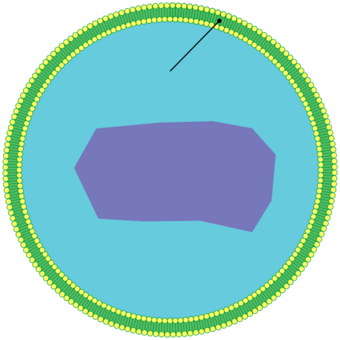Medicine:Peroxisomal disorder
| Peroxisomal disorder | |
|---|---|
 | |
| Basic structure of a peroxisome | |
| Specialty | Medical genetics |
Peroxisomal disorders represent a class of medical conditions caused by defects in peroxisome functions.[1] This may be due to defects in single enzymes[2] important for peroxisome function or in peroxins, proteins encoded by PEX genes that are critical for normal peroxisome assembly and biogenesis.[3]
Peroxisome biogenesis disorders
Peroxisome biogenesis disorders (PBDs) include the Zellweger syndrome spectrum (PBD-ZSD) and rhizomelic chondrodysplasia punctata type 1 (RCDP1).[4][5] PBD-ZSD represents a continuum of disorders including infantile Refsum disease, neonatal adrenoleukodystrophy, and Zellweger syndrome. Collectively, PBDs are autosomal recessive developmental brain disorders that also result in skeletal and craniofacial dysmorphism, liver dysfunction, progressive sensorineural hearing loss, and retinopathy.[4][5]
PBD-ZSD is most commonly caused by mutations in the PEX1, PEX6, PEX10, PEX12, and PEX26 genes.[6][7] This results in the over-accumulation of very long chain fatty acids and branched chain fatty acids, such as phytanic acid. In addition, PBD-ZSD patients show deficient levels of plasmalogens, ether-phospholipids necessary for normal brain and lung function.[citation needed]
RCDP1 is caused by mutations in the PEX7 gene, which encodes the PTS2 receptor.[8] RCDP1 patients can develop large tissue stores of branched chain fatty acids, such as phytanic acid, and show reduced levels of plasmalogens.
| Name | OMIM | Gene | ICD-10 |
|---|---|---|---|
| Zellweger syndrome | Online Mendelian Inheritance in Man (OMIM) 214100 | PEX1, PEX2, PEX3, PEX5, PEX6, PEX12, PEX14, PEX26 | Q87.82 |
| Infantile Refsum disease | Online Mendelian Inheritance in Man (OMIM) 266510 | PEX1, PEX2, PEX26 | E80.3 |
| Neonatal adrenoleukodystrophy | Online Mendelian Inheritance in Man (OMIM) 202370 | PEX5, PEX1, PEX10, PEX13, PEX26 | E71.331 |
| RCDP Type 1 | Online Mendelian Inheritance in Man (OMIM) 215100 | PEX7 | Q77.3 |
| Heimler syndrome | Online Mendelian Inheritance in Man (OMIM) 234580 | PEX1, PEX6 |
Enzyme and transporter defects
Peroxisomal disorders also include:
References
- ↑ Wanders, R. J. A.; Waterham, H. R. (2006). "Biochemistry of Mammalian Peroxisomes Revisited". Annual Review of Biochemistry 75: 295–332. doi:10.1146/annurev.biochem.74.082803.133329. PMID 16756494.
- ↑ Wanders, R.; Waterham, H. (2006). "Peroxisomal disorders: the single peroxisomal enzyme deficiencies". Biochimica et Biophysica Acta (BBA) - Molecular Cell Research 1763 (12): 1707–20. doi:10.1016/j.bbamcr.2006.08.010. PMID 17055078.
- ↑ Weller, S.; Gould, S. J.; Valle, D. (2003). "Peroxisome Biogenesis Disorders". Annual Review of Genomics and Human Genetics 4: 165–211. doi:10.1146/annurev.genom.4.070802.110424. PMID 14527301.
- ↑ 4.0 4.1 Steinberg, S.; Dodt, G.; Raymond, G.; Braverman, N.; Moser, A.; Moser, H. (2006). "Peroxisome biogenesis disorders". Biochimica et Biophysica Acta (BBA) - Molecular Cell Research 1763 (12): 1733–48. doi:10.1016/j.bbamcr.2006.09.010. PMID 17055079.
- ↑ 5.0 5.1 "Zellweger Spectrum Disorder". GeneReviews® [Internet] (University of Washington). 2020. NBK1448. PMID 20301621. https://www.ncbi.nlm.nih.gov/books/NBK1448/.
- ↑ Steinberg, S.; Chen, L.; Wei, L.; Moser, A.; Moser, H.; Cutting, G.; Braverman, N. (2004). "The PEX Gene Screen: molecular diagnosis of peroxisome biogenesis disorders in the Zellweger syndrome spectrum". Molecular Genetics and Metabolism 83 (3): 252–263. doi:10.1016/j.ymgme.2004.08.008. PMID 15542397.
- ↑ Yik, W. Y.; Steinberg, S. J.; Moser, A. B.; Moser, H. W.; Hacia, J. G. (2009). "Identification of novel mutations and sequence variation in the Zellweger syndrome spectrum of peroxisome biogenesis disorders". Human Mutation 30 (3): E467–E480. doi:10.1002/humu.20932. PMID 19105186.
- ↑ Braverman, N.; Steel, G.; Obie, C.; Moser, A.; Moser, H.; Gould, S. J.; Valle, D. (1997). "Human PEX7 encodes the peroxisomal PTS2 receptor and is responsible for rhizomelic chondrodysplasia punctata". Nature Genetics 15 (4): 369–376. doi:10.1038/ng0497-369. PMID 9090381.
- ↑ World Health Organization (7 December 1997). Application of the international classification of diseases to neurology: ICD-NA.. World Health Organization. pp. 119–. ISBN 978-92-4-154502-0. https://books.google.com/books?id=85RxDqXrx2EC&pg=PA119. Retrieved 23 November 2010.
External links
| Classification | |
|---|---|
| External resources |
- "Zellweger Spectrum Disorder". GeneReviews® [Internet] (University of Washington). 2020. NBK1448. PMID 20301621. https://www.ncbi.nlm.nih.gov/books/NBK1448/.
- Peroxisomal+disorders at the US National Library of Medicine Medical Subject Headings (MeSH)

